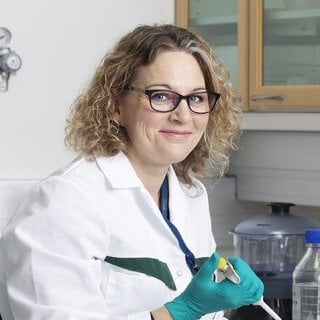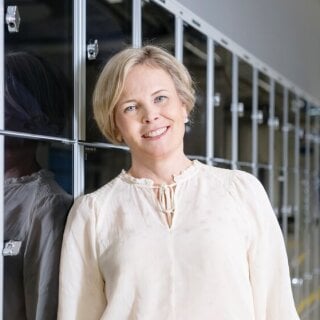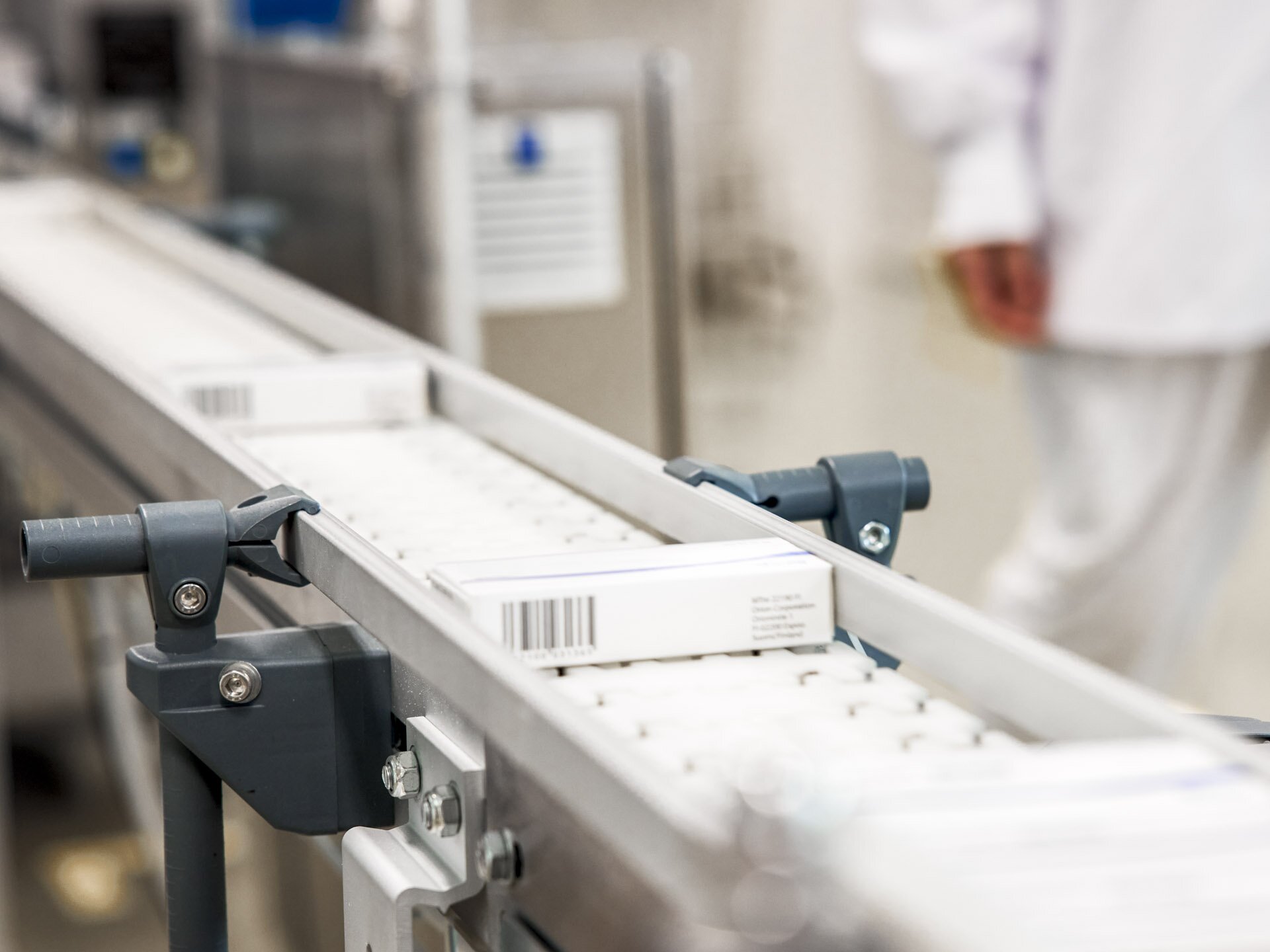“It all starts with an early interest in mathematics and science, but the meaningfulness of the work itself comes from helping people and improving their well-being.”
These are the words of Liisa Ailanen, Paula Rytilä, Tarja Ylinen and Satu Vartiainen from Orion. In this article, they discuss their careers and their work in the industry.

This is a great field for someone with a curious and analytical mind.
Liisa Ailanen
- Doctorate in Philosophy
- works as a Senior Scientist in Orion's Pain Research unit
Liisa, how did you end up in your current job?
I’ve always been good at mathematics, so I studied towards a degree in engineering after upper secondary school. I quickly realised it wasn’t for me. I was more interested in how the human body works at the cellular and molecular level and how diseases can be affected by medical treatment. I was admitted to a biosciences degree programme and chose pharmaceutical development as my main subject. After graduating with a Master’s degree, I continued as a post-graduate researcher, studying the mechanisms of obesity-related diseases.
When I completed my PhD in 2018, Orion was looking for a researcher to join the Central Nervous System Diseases Unit. I work in a research unit of more than 20 people that studies new drug development targets, mainly for chronic pain.
What is best about your job at Orion?
I can discover new things and combine existing knowledge with new insights. Research at Orion is inspiring because Orion is a major pharmaceutical company with excellent resources. In recent years, Orion has invested in the development of pain research, activitely encouraging innovative ideas. At the same time, Orion is a fairly small pharmaceutical company on a global scale, which allows for a high degree of flexibility.
Why should you apply for a job in the pharmaceutical industry?
This is a great field for someone who is passionate about science and has the inquisitive personality of a scientist. I anticipate a sustained demand in this field in the future, as people are living longer and diseases are increasing with age. On the other hand, only the easiest medicine development targets have been found, and there is a huge amount of uncharted territory ahead.
36%
During the spring 2023 joint application process for higher education, more than a third of applicants aiming for admission to university programs in technology were women. The corresponding proportion for universities of applied sciences was 23 per cent.
Source: Vipunen: Education Statistics Finland, Finnish National Agency for Education

In the pharmaceutical industry, I can treat a larger group of people instead of individual patients.
Paula Rytilä
- Respiratory Diseases and Allergy Specialist
- Based in Singapore. Head of Orion’s sales and marketing organisation in the Asia and Pacific region
Paula, how did you get your current job and what is your job description?
I was working at HUS as a pulmonologist and leading my own research group when I was offered a job at Orion. I had worked closely with the pharmaceutical industry and was curious to see what I could learn on this side.
I first worked as a medical director in Orion’s Medical Affairs department. Later, my responsibilities expanded to include pharmacovigilance, and then business development, sales and marketing. For the last two years, I have led Orion’s sales and marketing organisations in the Asia and Pacific region. I’m responsible for ensuring that we achieve the business goals set for us.
What is best about your job at Orion?
Orion offers plenty of opportunities for personal and professional development. My work is varied and I can challenge myself, but I don’t have to do it alone. It’s also great that I have been able to bring Finnish medicines to the world. Asia, in particular, has an attractive and rapidly developing pharmaceutical market.
Why should you apply for a job in the pharmaceutical industry?
I have witnessed the development of a few of Orion’s proprietary medicines from the very beginning, and I have seen how they help people around the world. In the pharmaceutical industry, things move faster than in the academic world. As a doctor, I can now treat a larger group of people rather than focusing on a single patient.
57%
Of all Orion employees, 57 per cent were women in 2022.

You can enter the industry with a wide range of qualifications.
Tarja Ylinen
- Studied process engineering at a university of applied sciences
- Production Manager for Orion’s Warehouse and Support team in Espoo
Tarja, how did you end up in your current role?
I had no clear career plans after upper secondary school. I was good at chemistry, physics and mathematics, so I decided to study process engineering. I completed apprenticeship training in a plastics packaging factory and then became a shift operator and shift supervisor in a polyester factory. When my temporary job ended, I started looking for a supervisory position in industry, and Orion had a vacancy.
I have worked at Orion for more than 20 years, first in tablet production and then as a supervisor in various production departments. Now I’m a Production Manager at the warehouse in Espoo. I ensure that the warehouse and support functions are run cost-effectively, safely and with high quality.
What is best about your job at Orion?
My work is tangible. I get to see how incoming materials are transformed into finished production batches. In addition, this is a highly regulated industry with strict guidelines, which brings security, provides support for decisions and creates a framework for your work.
Another reason why I enjoy working at Orion is that the atmosphere is positive and the workplace community challenges you to develop. You don’t have to change companies if you want to progress in your career.
Why should you apply for a job in the pharmaceutical industry?
The pharmaceutical industry offers a wide range of jobs, and the qualification requirements are also varied. I find that this work is more meaningful than many other industries. We make medicines that heal people and create well-being.
A total of 13,300 new employees will be needed in technology industry companies by 2033.
Source: Technology Industries of Finland

The pharmaceutical industry is characterised by a spirit of making things happen.
Satu Vartiainen
- Master of Science in Chemical Engineering and Master of Science in Economics
- Works as a Quality Manager at Orion’s subsidiary Fermion
Satu, how did you end up in your current job?
I’ve always been interested in mathematics and science, so I studied for a degree in Chemical Engineering after upper secondary school. Soon after graduating, I realised that I wanted a job geared towards concrete results. That’s what industry is all about.
I started at Orion as a cleaning validation engineer. My job was to ensure that the production washing processes were working reliably. I was quickly given more responsibility and a supervisory role. I wanted to broaden my skills, so I studied for a Master’s degree in Economics alongside my work. When I was working as the head of Orion’s Quality System unit, the opportunity to move to my current job at Fermion presented itself.
What is your job description and what do you like best about your job?
Fermion develops, manufactures and sells active pharmaceutical ingredients. I am responsible for Fermion’s quality control laboratories, quality assurance and registration of pharmaceuticals. Around 80 people work in jobs related to these areas in Espoo, Hanko and Oulu.
I work as a supervisor, and I also work with our customers on a daily basis. I’m also a member of Fermion’s management team.
I’ve been with Orion and Fermion for 23 years. I have been given encouragement and have been able to develop my skills. In my current job, I ensure that patients receive safe medicines that are manufactured in accordance with the regulatory requirements. It’s inspiring to work surrounded by top professionals and see what we can develop together.
Why should you apply for a job in the pharmaceutical industry?
The pharmaceutical sector is about building well-being and helping people. The work is varied and meaningful and involves responsibility. Recent years have also shown how important it is for the pharmaceutical industry to be able to react to unexpected situations and to ensure the availability of medicines in Finland.











